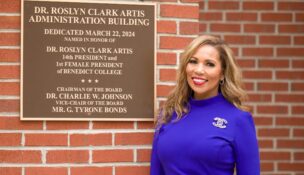Septima Clark honored with collectible coin
Staff Report //February 12, 2021//
Benedict College alumna and civil rights leader Septima Poinsette Clark is being honored with a collectible coin issued by the U.S. Mint.
 The $1 coin, part of the American Innovation collection in the mint’s H.I.P. Pocket Change kids series, depicts Clark marching with three Black students carrying books with the American flag in the background. The back of the coin features the Statue of Liberty.
The $1 coin, part of the American Innovation collection in the mint’s H.I.P. Pocket Change kids series, depicts Clark marching with three Black students carrying books with the American flag in the background. The back of the coin features the Statue of Liberty.
The daughter of a laundrywoman and former enslaved person, Clark was born in 1898 in Charleston. She graduated from high school in 1916 but, unable to attend college, passed the state teacher’s exam and began teaching on Johns Island. She taught for more than 30 years, including 18 in Columbia, and graduated from Benedict in 1942.
“Mrs. Septima Poinsette Clark is one of our most distinguished graduates and is most deserving of this celebrated honor,” Roslyn Clark Artis, Benedict president, said in a news release. “Clark developed literacy and citizenship workshops that played an important role in the drive for voting and civil rights. Unfortunately, many young people are unaware of the depth and breadth of her contributions. She was widely known as ‘Queen Mother’ to those who knew her.”
Clark earned a master’s degree from then-Hampton (Va.) Institute in 1946. She worked with the YWCA and participated in a class-action lawsuit filed by the NAACP that led to equal pay for Black and white teachers in South Carolina.
Forced from her teaching position in South Carolina after the 1956 passing of a statute that prohibited city and state employees from belonging to civil rights organizations, Clark taught literacy and civil skills such as filling out voter registration forms at the Highlander Folk School in Monteagle, Tenn. When that school closed in 1961, Clark became the director of education and teaching for the Southern Christian Leadership Conference.
Clark retired from the SCLC in 1970 and conducted workshops for international youth exchange organization American Field Service. She was elected to school board service in Charleston in 1975, and the following year, S.C. Gov. John West restored her teacher’s pension after declaring she had been unjustly fired in 1956.
In 1979, Clark, who published two memoirs, received a Living Legacy Award from President Jimmy Carter.
Clark died in 1987.
“She is a trailblazer … because she believed and understood that knowledge could empower marginalized people in ways that the legal equality system in this country could not,” Clark said. “She pioneered the link between education and political organizing with the purpose of gaining the right to vote – thus, an equal voice as an American citizen.”
-















